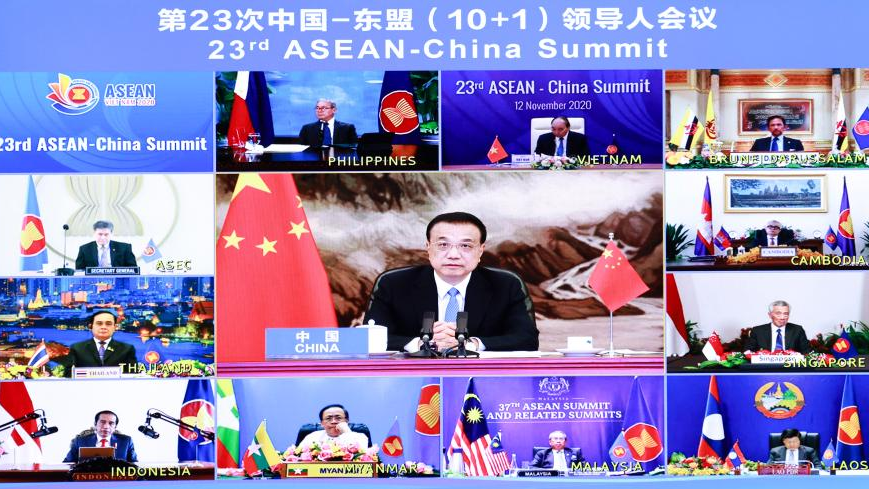Newspaper Article 14/11/2020
Amid efforts by the projected winner of the U.S. election Joe Biden to reach out to Quad member states, Southeast Asian leaders met in Hanoi, Vietnam on November 12 to address pressing issues such as lingering tensions in the South China Sea, the growing potency of COVID-19 and economic recovery efforts for the region.
This summit is taking place in a region where American provocations in the South China Sea have resulted in a spike in tensions between China and the U.S., with attempts to polarize states entailing that this comes at a critical juncture. The transition period from the Trump administration to the Biden administration has also meant that future Washington’s policies would impact the ASEAN region given wider implications for regional security. Yet, ASEAN member states have clearly eschewed partisanship for a joint, coordinated and practical approach towards tackling issues due to a number of reasons.
Firstly, the participating member states are committed to a policy of non-alignment and have refrained from being drawn into either camp given the pernicious effects of geopolitical rivalries on economic interests. This was stated by the Vietnamese Prime Minister, Nguyen Xuan Phuc during the 37th summit which kicked off in his nation’s capital. Vietnam currently holds chairmanship of the 10-member bloc which features prominent economic powers such as Malaysia and Singapore in its ranks.
Furthermore, despite Vietnam’s differences with China, Hanoi has refrained from openly endorsing the Trump administration’s bellicose rhetoric against Beijing. Kuala Lumpur and Singapore also have longstanding, nuanced ties with China where there is an understanding that conflicts are detrimental towards greater regional connectivity and economic prosperity, particularly as the second wave of the pandemic has hit Asian shores. In addition, Indonesia despite having standoffs with China has also adopted a balanced approach in its foreign policy.
It is hence important that the incoming Biden administration views ASEAN’s commitment towards regional peace as inclusive instead of exclusive of China. The U.S. has historically peddled with wooing in states in the Asia Pacific to counter Chinese influence with U.S. Secretary of State Mike Pompeo’s visit to Japan and address to Quad member states oozing with anti-Beijing rhetoric.
Similarly, American attempts to persuade regional powers in South Asia such as India to play a more dominant and assertive role in East Asia has only contributed to a widening of trust deficits and unwarranted provocations. The same approach does not apply to the ASEAN member states given the paramount importance attached to de-escalation, increased economic connectivity and a close relationship with Beijing.
China was present at the virtual summit which includes meetings between ASEAN member states and South Korea, the U.S., Australia, Japan, India and China itself.
Chinese Premier Li Keqiang pledged that Beijing would be closely working with ASEAN member states on the path towards peaceful development with the purpose of upholding peace and stability in the region.

Chinese Premier Li Keqiang attends the 23rd China-ASEAN leaders’ meeting, which is held via video link, at the Great Hall of the People in Beijing, capital of China, November 12, 2020. /Xinhua
The summit also includes Rodrigo Duterte, president of the Philippines, who has repeatedly placed emphasis on distancing Manila from the U.S. and the EU and prioritizing his country’s relationship with Russia and China.
President Duterte’s comments in the summit were squarely directed on dealing with the COVID-19 pandemic and placed emphasis on joint collaborations between all states regardless of the rich/poor divide to ensure that safe access to a vaccine is guaranteed. The priorities of member states are in line with issues of significance without any consideration for participating in military build ups in the South China Sea or aligning their foreign policies with Washington, D.C. at the expense of Beijing or vice versa.
ASEAN member states are all set to sign the China-backed Regional Comprehensive Economic Partnership (RCEP) on Sunday which based on sheer volume, will be the world’s largest trade deal. The mega regional deal includes 15 countries in the Asia Pacific region such as China, Japan, South Korea, Australia and New Zealand alongside ASEAN member states.
This deal will be signed after eight years of negotiations and include one third of the world’s population and global gross domestic product (GDP), while dwarfing the U.S.-Mexico-Canada Agreement and the subsequent Comprehensive Progressive Agreement for Trans-Pacific Partnership (CPTPP), which was the result of U.S. withdrawal in 2017. The stakes of close cooperation are thus, high and each of the ASEAN member states understand that the grueling eight-year negotiations which led to the RCEP cannot be hijacked or jeopardized due to geopolitical rivalry.
Experts have also suggested that it is necessary for the RCEP to materialize quickly as American attempts to resuscitate the CPTPP under Joe Biden could result in attempts to woo over ASEAN states into Washington’s camp and contribute towards further instability. RCEP is based upon China’s position as an economic partner instead of a competitor for all states involved.
The ASEAN summit and the priorities of its member states clearly indicate that Cold War binaries and provocations are to be avoided at all costs. Deputy Foreign Minister of China, Luo Zhaohui mentioned how the Asian Pacific strategy proposed by the U.S. is largely a security and military grouping which elevates the threat perception in the South China Sea.
On ASEAN and China’s roles however, RCEP has no military connotation nor are member states inclined towards pursuing partisanship given the severity of issues such as the pandemic despite having close ties with the United States. This balanced approach bodes well for the region’s future and challenges the very foundation of the Trump Doctrine. The incoming Biden administration could do well to avoid it at all costs.
Note: This article appeared in CGTN, dated 14 November 2020.
Disclaimer: The views expressed in the article are of the author and do not necessarily represent Institute’s policy.
